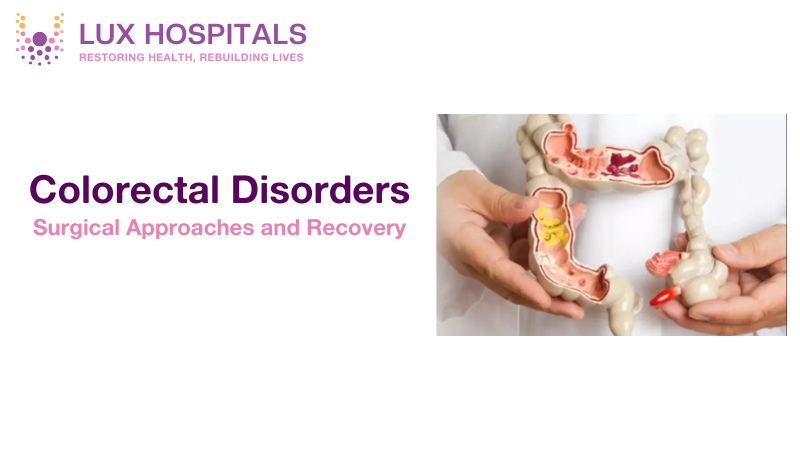Colorectal Disorders: Surgical Approaches and Recovery

Millions of people worldwide suffer from colorectal disease, which affects both their general health and digestive system. Effective management of colorectal diseases requires surgical surgery when conservative measures are ineffective. This article explores different surgical approaches, recovery times, and associated costs while answering common questions about colorectal surgery.
Understanding Colorectal Disease
Colorectal disease refers to a broad spectrum of conditions that affect the colon and rectum, including colorectal cancer, polyps, diverticulitis, inflammatory bowel disease (IBD), and hemorrhoids. Colorectal disease symptoms vary depending on the specific disorder but often include abdominal pain, changes in bowel habits, rectal bleeding, and unexplained weight loss.
What is Colorectal Disease?
Colorectal disease encompasses various conditions affecting the colon and rectum. These disorders range from benign issues, such as hemorrhoids and anal fissures, to severe conditions, like colorectal cancer. Early detection and proper medical intervention are crucial in managing colorectal disease effectively.
Surgical Approaches for Colorectal Disorders
Surgery is often required when medication and lifestyle changes are not enough to manage colorectal disease. The type of colorectal surgery performed depends on the severity and nature of the disorder.
- Open Surgery
Traditionally, open surgery involves making a large incision in the abdomen to remove diseased tissue. While effective, it requires a longer colorectal surgery recovery time and poses a higher risk of complications.
- Laparoscopic Colorectal Surgery
A less invasive approach, laparoscopic surgery involves making small incisions and using a camera-guided instrument to remove affected areas. This technique results in shorter hospital stays, faster recovery, and reduced pain.
What is Laparoscopic Colorectal Surgery?
Small incisions are made during laparoscopic colorectal surgery, a minimally invasive technique, to remove diseased colon or rectum sections. Compared to open surgery, it delivers less discomfort after surgery, faster healing, and fewer problems.
- Robotic-Assisted Surgery
Robotic-assisted surgery enhances laparoscopic techniques by using robotic arms for greater precision. This method improves surgical outcomes, reduces blood loss, and accelerates recovery.
- Laser Surgery for Colorectal Disorders
Laser technology is increasingly used for treating hemorrhoids, anal fistulas, and certain colorectal tumours. It offers minimal blood loss, quicker recovery, and lower risks of infection.
Is Laser Surgery for Colorectal Painless?
In general, laser surgery is less painful than conventional techniques for treating colorectal disorders. Because fewer incisions are made, there is less discomfort following surgery, and the healing process is accelerated.
Recovery After Colorectal Surgery
The recovery process after colorectal surgery varies depending on the type of procedure performed, overall health, and adherence to postoperative care guidelines.
Colorectal Surgery Recovery Time
- Minimally Invasive Surgery: Recovery typically takes 2 to 4 weeks.
- Open Surgery: Recovery may extend to 6 to 8 weeks.
- Laser Surgery: Healing is faster, often within a few days to a few weeks.
Post-Surgical Care and Tips for Recovery
- Pain Management: To alleviate pain, doctors suggest changing lifestyles and consuming painkillers.
- Modification of Diet: The recovery is then followed by a high-fiber diet, good hydration, and the consumption of meals not too large.
- Physical Activity: Gentle movement prevents blood clots, but heavy activity must be avoided.
- Follow-Up Visits: Regular follow-up visits ensure proper healing and detect any issues early.
Conclusion
Although surgery provides good treatment options, colorectal disease can place a severe burden on everyday life. The patient must be informed of recovery time and costs involved in opting for laser treatment, laparoscopic surgery, or open surgery. The appropriate surgical strategy for the greatest outcomes is determined with the assistance of a specialist consultation.
Frequently Asked Questions
It is a minimally invasive procedure using small incisions and a camera-guided instrument to remove affected areas of the colon or rectum.
Common symptoms include rectal bleeding, changes in bowel habits, abdominal pain, unexplained weight loss, and fatigue.
Colorectal surgery is performed through open surgery, laparoscopic methods, or robotic-assisted techniques, depending on the condition and severity of the disease.
Laser surgery involves minimal incisions and is less painful than traditional surgical methods.
While all surgeries have risks, advancements in medical technology have made colorectal surgeries safer with lower complication rates.
Hospital stays vary by procedure: 2-5 days for laparoscopic surgery, 5-7 days for open surgery, and 1-2 days for laser procedures.
Maintaining a high-fiber diet, regular screenings, avoiding smoking, and staying active can help reduce the risk of colorectal disease.
Not all patients require a colostomy bag. The need depends on the extent of surgery and whether the bowel can be reconnected.
Patients can typically return to light activities within 2-4 weeks, while full recovery may take up to 8 weeks, depending on the procedure. Patients can make informed decisions for better health outcomes by understanding colorectal disorders and available surgical options.




















